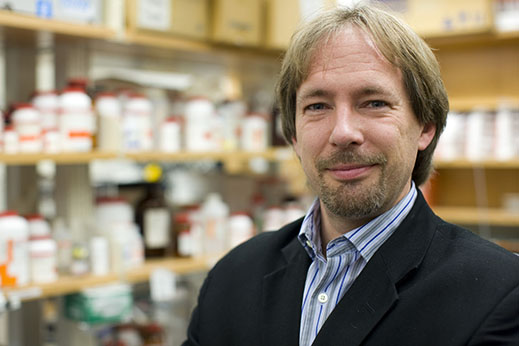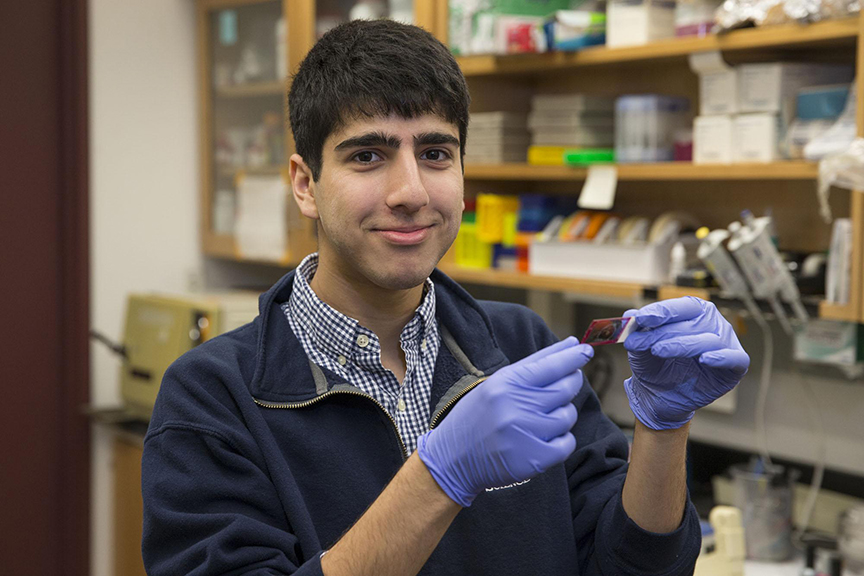University of Virginia undergraduates eager to conduct research with top scientists on Grounds will continue to have the opportunity to become a Beckman Scholar.
The Arnold and Mabel Beckman Foundation has renewed for three years its commitment to UVA to fund two scholarships a year for students performing research in the hard sciences.
Each scholar works for two summers and the academic year in between, receiving $19,300 in funding, including stipends, supplies and travel. The Beckman Scholars Program at UVA began in 2010.

Biomedical engineer William Guilford says the Beckman Scholarships are the highest award bestowed at UVA for undergraduate research.
These mentors include eight faculty members from biomedical engineering, four from chemistry and three from biology.
“They are a truly extraordinary group,” Guilford said. “The laboratories of these 15 talented mentors have generated 100 papers with 105 undergraduate coauthors since 2009, are presently home to 87 talented undergraduates and have collectively trained more than 300 undergraduate students in their labs over the past five years alone.”
The Beckmans are offered at only 12 universities across the country.
“The Beckman Scholarships are nationally coveted, and so it speaks volumes about the quality of our students and the quality of our faculty that we have been awarded our third such program,” Guilford said. “In fact, the Beckman Scholarships are the highest award bestowed at UVA for undergraduate research.”
The Beckman Scholarships were established by the Arnold and Mabel Beckman Foundation, which was created by the late Arnold Beckman, a chemist, inventor and entrepreneur. He invented the pH meter, the first oxygen meter, the first widely available spectrophotometer and a variety of electronics; he also created tools specifically for the Manhattan Project. In his later years, he turned to philanthropy, funding several major research centers, but ultimately focused his philanthropy on science education.
This year, in an arrangement with the Beckman Foundation, the University will require its Beckman Scholars to take a specific writing course.
“Experimental work is incomplete until new discoveries are disseminated through publication,” Guilford said. “Of equal importance, writing about one’s research forces the scientist to challenge assumptions and perform additional research. Thus writing is a necessary component of the research process, though it is seldom treated as such when mentoring undergraduates.”
The University will offer a new, three-credit course, “Applied Scientific Writing,” in collaboration with UVA’s Academic and Professional Writing Program, focusing on scientific writing, graphics and illustration. Students will bring their own data to the course, and it will guide them through the process of preparing their work for publication.
The course will be available as an elective to other undergraduates, including students in the College Science Scholars and the Neuroscience Program. This course will be sponsored by the Office of the Vice President for Research and the Office of the Executive Vice President and Provost.
There are currently three Beckman Scholars, two of whom are funded by the Beckman Foundation and one of whom has been jointly funded by the Office of the Vice President for Research and the dean’s offices of the College of Arts & Sciences and the School of Engineering and Applied Science.
Caroline Kerr, a third-year chemistry major, is trying to develop a new class of nano-scale oxygen sensors that can be directed to any tissue and may be used to picture oxygen in cancerous tumors and other tissues.
Yi-Ting Liu, a third-year neuroscience major, is researching the neurotransmitter dopamine in nerve cells and how that location is tied to the biological clock, particularly the internal rhythm of sleep and arousal.
Naveed Tavakol, third-year biomedical engineering major, is studying pericytes – cells that surround the endothelial cells that line capillaries – to understand whether pericytes can change into smooth muscle cells, and in so doing, if they contribute to the growth of new blood vessels.
Media Contact
Article Information
January 21, 2016
/content/beckman-programs-renewal-offers-unique-research-chance-undergrads

